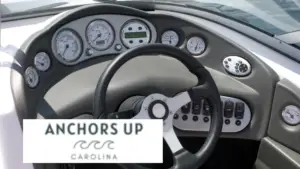The last thing you want to do is spend money unnecessarily, and it applies closely to boating. Taking into consideration different factors that impact fuel burn will help you keep more money in your wallet. I recommend analyzing these 10 ways to make your boat more fuel efficient. Keeping fuel efficiency on your radar is always beneficial, especially as an avid boater.
Properly Maintain The Engine
Without question, improper engine maintenance can result in poor fuel economy. One of the biggest factors that impact fuel burn is a dirty fuel filter.
Rather than the proper amount of fuel being delivered for combustion, the flow is restricted. As a result, the oxygen and fuel mixture does not combust as it should, thus increasing the amount of fuel burned.
Secondly, combustion is also directly related to the performance of the engine’s spark plugs. Fouled spark plugs fail to ignite the fuel at a normal rate, thus causing increased fuel burn.
I recommend following a routine engine maintenance schedule to prevent the motor from being a cause of excess fuel burn.
Reduce Your Speed
Look, it is unfair to say that reducing your speed will always positively impact fuel burn rates. Keep in mind that water moving against the hull of a boat can cause a substantial amount of resistance.
With that said, you will need to find a balance. At idle speed, the vessel is unlikely to plow through the water, and it is combined with low engine rotations per minute. For this reason, the efficiency remains high.
Conversely, reducing drag while planing also reduces fuel consumption. This is because a smaller portion of the hull is making contact with the water. However, this doesn’t mean you should pin the throttle wide open. The vessel will burn excessive fuel with the throttle pinned, which is why the boat has a specific cruising RPM.
Clean The Boats Hull
One of the leading causes of excessive fuel burn is a dirty hull beneath the waterline. The hulls become fouled in barnacles in salt environments.
Not only does barnacle growth add weight, but it increases resistance. The barnacles cause a disruption to the water flow across the hull.
In order to reduce fuel burn, it is imperative to have the hull of the vessel cleaned in saltwater environments by divers on a routine basis.
Create A Course Line In The Marine Chart Plotter
Route planning is often overlooked as a means of lower fuel costs. Rather than zig-zagging from one point to another, creating a course line in the chart plotter will reduce run time.
Often, the distance traveled can be reduced by cutting corners or passing through cuts and channels. For this reason, you should study the chart plotter and create a course line that reduces the distance from destination to destination.
However, ensure that you are not putting yourself at risk of passing over shallow water or other dangerous objects.
Never Underpower the Boat
Although it may be less expensive to buy a boat with a lower horsepower rating, you’ll spend more money on fuel if the boat is underpowered.
Unfortunately, when a boat is fitted with an engine too small, it is required to work substantially harder. The reason is that it does not have the horsepower to push the combination of the weight of the boat, people, and objects on board.
As a result, the hull is sluggish to get on plane or fails to get on a plane, creating increased drag and fuel burn.
I recommend avoiding buying boats that are fitted with a minimum engine rating.
Do Not Decelerate And Accelerate Often
Similar to stopping and going in a car, the same applies to a boat. Coming off plane repetitively during a day on the water will, without question, increase fuel consumption.
I get it; you can’t run the boat at cruising RPM for the entirety of the trip between waves, traffic, docking, channels, and more. However, do your best to prevent stopping and starting because the highest rate of burning is while accelerating until the vessel gets on plane.
Avoid Engine Idle Time
I’ll be the first to admit that I often let my boat engine idle, especially when fishing for a certain period of time. The reason I idle is to ensure my anchor is set or the trolling motor is holding position. Once I confirm the vessel is held in the proper position, I turn the motor off.
Rather than allowing the engine to run dockside while fishing, beaching, or drifting, shut it down and let the anchor or trolling motor do the work. Idling an engine simply burns fuel for no reason.
Pair The Engine With The Proper Propeller
Without a doubt, an improperly pitched propeller or damaged propeller will negatively impact fuel efficiency.
An improperly pitched prop, without question, impacts the performance of the engine on a vessel. The key is to get the boat up on plane at a lower RPM to help improve fuel efficiency. For this reason, it is important to match the proper propeller with the boat and motor.
Secondly, a dinged prop causes a disruption of water flow. The disruption causes increased fuel burn. Unquestionably, if the propeller is damaged, it needs to be repaired.
Remove Any Access Weight On The Boat
Excessive weight onboard the vessel can be attributed to a few different sources. The two sources are water in the bilge in addition to overloading gear.
Water In The Bilge
The bilge of a boat is the lowest point and, therefore, collects water from the decks or leaks. One of the primary reasons that water collects is the result of a failed bilge pump.
I have been onboard a boat that failed to get on plane. Instead, the bow ran high while the stern dug deep. Needless to say, the vessel would not get up on plane. Quickly, I realized I needed to empty the bilge, or else I would burn excess fuel due to failing to properly plane out.
Excessive Gear Onboard The Vessel
Similar to weight from water, weight from gear also negatively impacts performance.
Access weight from gear is often associated with hunting trips, visiting islands, or transporting supplies.
Importantly, you never want to exceed the designated weight capacity, or else the boat will fail to plane correctly. If you’re overloading the boat with gear, you can expect to burn more fuel.
Buy A Boat With A Fuel Efficient Engine
Technology has come a long way when it comes to marine engines. No longer are they puffing black smoke and running through gallons of gasoline an hour at idle.
Today, the four stroke engines have significantly lowered operating costs directly related to fuel burn.
I suggest pairing your boat with a high-efficiency engine, no matter if you’re buying new or repowering your current hull.
Follow These 10 Fuel Efficiency Tips
There is no sense in wasting money when you’re out doing what you like doing, and that is boating. Fuel efficiency can be improved if you consider just a few of the tips mentioned above. Reducing fuel burn is especially important if you’re an avid boater and use your vessel regularly. Running the boat week after week becomes expensive.







